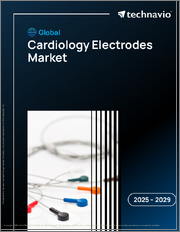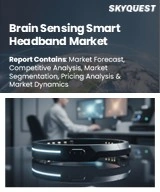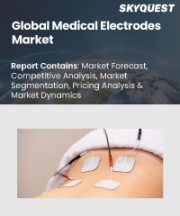
|
시장보고서
상품코드
1792295
의료용 전극 시장 보고서(2025-2033년) : 전극 유형, 사용성, 기술, 용도, 최종 사용자, 지역별Medical Electrodes Market Report by Electrode Type, Usability, Technology, Application, End User, and Region 2025-2033 |
||||||
세계의 의료용 전극 시장 규모는 2024년 13억 1,120만 달러에 달했습니다. 향후 IMARC Group은 시장 규모가 2033년에는 18억 1,300만 달러에 이르고, 2025-2033년 성장률(CAGR)은 3.48%가 될 것으로 예측했습니다.
의료용 전극은 신체의 이온 전류를 생체 측정을 위한 전류로 변환하는 데 사용되는 고체 전자 도체입니다. 금속 부분, 리드, 전극, 전도성 페이스트로 구성되어 다양한 신경, 눈, 심장, 근육 질환의 진단을 돕습니다. 심전도(ECG), 뇌파(EEG), 근전도(EMG)와 같은 생체 신호를 수신하기 위해 해부학적 부위에 따라 여러 의료용 전극이 사용됩니다. 이 전극은 합리적인 가격으로 일회용, 멸균 및 투여용으로 쉽게 사용되므로 의료 전문가에게 매우 선호됩니다. 이러한 장점으로 의료용 전극은 병원, 진단센터, 의료 연구 기관에서 정형외과, 심혈관 수술, 미용 수술 및 신경 외과의 다양한 수술에 널리 사용됩니다.
파킨슨병, 알츠하이머병, 근섬유통, 각종 뇌 장애 등의 퇴행성 신경질환 및 심장질환의 유병률 증가는 시장 성장의 주요 촉진요인입니다. 게다가, 질병의 조기 진단의 필요성을 높이는 노인 인구 증가는 또한 의료용 전극 수요를 세계적으로 높이고 있습니다. 또한 투자 증가와 유리한 시책을 통한 정부 지원도 시장 성장을 뒷받침하고 있습니다. 이러한 요인으로 인해 연구개발(R&D)이 대폭 증가하여 사회적 약자가 질 높은 헬스케어에 쉽게 접근할 수 있게 되어 의료 인프라가 정비되고, 의료용 전극의 가격은 누구나 이용하기 쉽도록 가격이 낮아지고 있습니다. 게다가 나노기술의 진보 등의 기술 개발은 이러한 전극의 소형화를 가능하게 하고, 다양한 저침습 수술로의 응용이 용이해졌습니다.
이 보고서에서 다루는 주요 질문
- 세계의 의료용 전극 시장의 현재까지의 추이와 향후 몇 년간의 추이는?
- 세계의 의료용 전극 시장에서 주요 지역 시장은?
- 세계의 의료용 전극 산업에서 COVID-19의 영향은?
- 전극 유형에 따른 시장 내역은?
- 사용성에 따른 시장 분석은?
- 기술에 따른 시장 분석은?
- 용도에 따른 시장 분석은?
- 최종 사용자에 따른 시장 분석은?
- 세계의 의료용 전극 산업의 밸류 체인에서의 다양한 단계는?
- 세계의 의료용 전극 산업의 주요 촉진요인과 과제는?
- 세계의 의료용 전극 산업의 구조와 주요 진출기업은?
- 세계의 의료용 전극 산업의 경쟁도는?
- 세계의 의료용 전극 산업의 이익률은?
목차
제1장 서문
제2장 조사 범위와 조사 방법
- 조사의 목적
- 이해관계자
- 데이터 소스
- 1차 정보
- 2차 정보
- 시장 추정
- 상향식 접근
- 하향식 접근
- 조사 방법
제3장 주요 요약
제4장 소개
- 개요
- 주요 산업 동향
제5장 세계의 의료용 전극 시장
- 시장 개요
- 시장 실적
- COVID-19의 영향
- 시장 내역 : 전극 유형별
- 시장 분석 : 사용성별
- 시장 분석 : 기술별
- 시장 분석 : 용도별
- 시장 분석 : 최종 사용자별
- 시장 분석 : 지역별
- 시장 예측
제6장 시장 내역 : 전극 유형별
- 진단용 전극
- 시장 분석 : 유형별
- 심전도(ECG) 전극
- 근전도(EMG) 전극
- 뇌파(EEG) 전극
- 전기안진(ENG) 전극
- 신생아용 전극
- 태아 두피 전극
- 기타
- 시장 분석 : 유형별
- 치료용 전극
- 시장 분석 : 유형별
- 제세동기 전극
- 전기 수술용 전극
- 페이스메이커 전극
- 경피적 전기신경자극(TENS) 전극
- 기타
- 시장 분석 : 유형별
제7장 시장 분석 : 사용성별
- 일회용 의료용 전극
- 다회용 의료용 전극
제8장 시장 분석 : 기술별
- 표면 전극
- 바늘 전극
제9장 시장 분석 : 용도별
- 심장병학
- 신경생리학
- 수면장애
- 수술 중 모니터링
- 기타
제10장 시장 내역 : 최종 사용자별
- 병원
- 진단센터
- 의료연구기관
- 기타
제11장 시장 분석 : 지역별
- 북미
- 유럽
- 아시아태평양
- 중동 및 아프리카
- 라틴아메리카
제12장 SWOT 분석
- 개요
- 강점
- 약점
- 기회
- 위협
제13장 밸류체인 분석
제14장 Porter's Five Forces 분석
- 개요
- 구매자의 협상력
- 공급기업의 협상력
- 경쟁도
- 신규 참가업체의 위협
- 대체품의 위협
제15장 가격 분석
- 주요 가격 지표
- 가격구조
- 마진 분석
제16장 경쟁 구도
- 시장 구조
- 주요 기업
- 주요 기업 프로파일
- Medtronic PLC
- CONMED
- 3M Company
- Koninklijke Philips NV
- Ambu A/S
- Dymedix Diagnostics
- Natus Medical Incorporated
- Cognionics Inc.
- Cooper Surgical Inc.
- ZOLL Medical Corporation
- CR Bard Inc.
- Rhythmlink International company
- NeuroSky
- GE Healthcare
The global medical electrodes market size reached USD 1,311.2 Million in 2024. Looking forward, IMARC Group expects the market to reach USD 1,813.0 Million by 2033, exhibiting a growth rate (CAGR) of 3.48% during 2025-2033.
A medical electrode is a solid electronic conductor that is used to transfer the ionic current in the body into electric current for biological measurements. It comprises a metal part, lead and an electrode conducting paste and assists in the diagnosis of various nervous, ocular, cardiac and muscular disorders. Depending upon the anatomical location, multiple medical electrodes are used to receive bio-signals such as Electrocardiogram (ECG), electroencephalogram (EEG) and Electromyogram (EMG). Medical professionals highly prefer these electrodes as they are affordable, disposable, sterilizable and easy to administer. Owing to these benefits, they find wide application in various orthopedic, cardiovascular, cosmetic and neurosurgeries in hospitals, diagnostic centers and medical research institutions.
The increasing prevalence of degenerative neurological and cardiological diseases, such as Parkinson's, Alzheimer's, fibromyalgia and various brain disorders, is a key driving factor for the market growth. Furthermore, the rising geriatric population that has created a need for early diagnosis of ailments is also increasing the demand for medical electrodes globally. Also, increasing investments and government support through favorable policies is catalyzing the growth of the market. Owing to these factors, there has been a significant increase in research and development (R&D) to ensure easy access to quality healthcare for the vulnerable population and developing healthcare infrastructure while making it affordable for all. Moreover, technological developments such as advancements in nanotechnology have enabled miniaturization of these electrodes and facilitated their application for various minimally invasive surgeries.
Key Market Segmentation:
Breakup by Electrode Type:
- Diagnostic Electrodes
- Electrocardiogram (ECG) Electrodes
- Electromyogram (EMG) Electrodes
- Electroencephalogram (EEG) Electrodes
- Electronystagmogram (ENG) Electrodes
- Neonatal Electrodes
- Fetal Scalp Electrodes
- Others
- Therapeutic Electrodes
- Defibrillator Electrodes
- Electrosurgical Electrodes
- Pacemaker Electrodes
- Transcutaneous Electrical Nerve Stimulation (TENS) Electrodes
- Others
Breakup by Usability:
- Disposable Medical Electrodes
- Reusable Medical Electrodes
Breakup by Technology:
- Surface Electrodes
- Needle Electrodes
Breakup by Application:
- Cardiology
- Neurophysiology
- Sleep Disorders
- Intraoperative Monitoring
- Others
Breakup by End User:
- Hospitals
- Diagnostic Centers
- Medical Research Institutions
- Others
Breakup by Region:
- North America
- Europe
- Asia Pacific
- Middle East and Africa
- Latin America
Competitive Landscape:
The report has also analysed the competitive landscape of the market with some of the key players being Medtronic PLC, CONMED, 3M Company, Koninklijke Philips N.V., Ambu A/S, Dymedix Diagnostics, Natus Medical Incorporated, Cognionics Inc., Cooper Surgical Inc., ZOLL Medical Corporation, C. R. Bard Inc., Rhythmlink International company, NeuroSky and GE Healthcare.
Key Questions Answered in This Report:
- How has the global medical electrodes market performed so far and how will it perform in the coming years?
- What are the key regional markets in the global medical electrodes industry?
- What has been the impact of COVID-19 on the global medical electrodes industry?
- What is the breakup of the market based on the electrode type?
- What is the breakup of the market based on the usability?
- What is the breakup of the market based on the technology?
- What is the breakup of the market based on the application?
- What is the breakup of the market based on the end user?
- What are the various stages in the value chain of the global medical electrodes industry?
- What are the key driving factors and challenges in the global medical electrodes industry?
- What is the structure of the global medical electrodes industry and who are the key players?
- What is the degree of competition in the global medical electrodes industry?
- What are the profit margins in the global medical electrodes industry?
Table of Contents
1 Preface
2 Scope and Methodology
- 2.1 Objectives of the Study
- 2.2 Stakeholders
- 2.3 Data Sources
- 2.3.1 Primary Sources
- 2.3.2 Secondary Sources
- 2.4 Market Estimation
- 2.4.1 Bottom-Up Approach
- 2.4.2 Top-Down Approach
- 2.5 Forecasting Methodology
3 Executive Summary
4 Introduction
- 4.1 Overview
- 4.2 Key Industry Trends
5 Global Medical Electrodes Market
- 5.1 Market Overview
- 5.2 Market Performance
- 5.3 Impact of COVID-19
- 5.4 Market Breakup by Electrode Type
- 5.5 Market Breakup by Usability
- 5.6 Market Breakup by Technology
- 5.7 Market Breakup by Application
- 5.8 Market Breakup by End User
- 5.9 Market Breakup by Region
- 5.10 Market Forecast
6 Market Breakup by Electrode Type
- 6.1 Diagnostic Electrodes
- 6.1.1 Market Trends
- 6.1.2 Market Breakup by Type
- 6.1.2.1 Electrocardiogram (ECG) Electrodes
- 6.1.2.2 Electromyogram (EMG) Electrodes
- 6.1.2.3 Electroencephalogram (EEG) Electrodes
- 6.1.2.4 Electronystagmogram (ENG) Electrodes
- 6.1.2.5 Neonatal Electrodes
- 6.1.2.6 Fetal Scalp Electrodes
- 6.1.2.7 Others
- 6.1.3 Market Forecast
- 6.2 Therapeutic Electrodes
- 6.2.1 Market Trends
- 6.2.2 Market Breakup by Type
- 6.2.2.1 Defibrillator Electrodes
- 6.2.2.2 Electrosurgical Electrodes
- 6.2.2.3 Pacemaker Electrodes
- 6.2.2.4 Transcutaneous Electrical Nerve Stimulation (TENS) Electrodes
- 6.2.2.5 Others
- 6.2.3 Market Forecast
7 Market Breakup by Usability
- 7.1 Disposable Medical Electrodes
- 7.1.1 Market Trends
- 7.1.2 Market Forecast
- 7.2 Reusable Medical Electrodes
- 7.2.1 Market Trends
- 7.2.2 Market Forecast
8 Market Breakup by Technology
- 8.1 Surface Electrodes
- 8.1.1 Market Trends
- 8.1.2 Market Forecast
- 8.2 Needle Electrodes
- 8.2.1 Market Trends
- 8.2.2 Market Forecast
9 Market Breakup by Application
- 9.1 Cardiology
- 9.1.1 Market Trends
- 9.1.2 Market Forecast
- 9.2 Neurophysiology
- 9.2.1 Market Trends
- 9.2.2 Market Forecast
- 9.3 Sleep Disorders
- 9.3.1 Market Trends
- 9.3.2 Market Forecast
- 9.4 Intraoperative Monitoring
- 9.4.1 Market Trends
- 9.4.2 Market Forecast
- 9.5 Others
- 9.5.1 Market Trends
- 9.5.2 Market Forecast
10 Market Breakup by End User
- 10.1 Hospitals
- 10.1.1 Market Trends
- 10.1.2 Market Forecast
- 10.2 Diagnostic Centers
- 10.2.1 Market Trends
- 10.2.2 Market Forecast
- 10.3 Medical Research Institutions
- 10.3.1 Market Trends
- 10.3.2 Market Forecast
- 10.4 Others
- 10.4.1 Market Trends
- 10.4.2 Market Forecast
11 Market Breakup by Region
- 11.1 North America
- 11.1.1 Market Trends
- 11.1.2 Market Forecast
- 11.2 Europe
- 11.2.1 Market Trends
- 11.2.2 Market Forecast
- 11.3 Asia Pacific
- 11.3.1 Market Trends
- 11.3.2 Market Forecast
- 11.4 Middle East and Africa
- 11.4.1 Market Trends
- 11.4.2 Market Forecast
- 11.5 Latin America
- 11.5.1 Market Trends
- 11.5.2 Market Forecast
12 SWOT Analysis
- 12.1 Overview
- 12.2 Strengths
- 12.3 Weaknesses
- 12.4 Opportunities
- 12.5 Threats
13 Value Chain Analysis
14 Porters Five Forces Analysis
- 14.1 Overview
- 14.2 Bargaining Power of Buyers
- 14.3 Bargaining Power of Suppliers
- 14.4 Degree of Competition
- 14.5 Threat of New Entrants
- 14.6 Threat of Substitutes
15 Price Analysis
- 15.1 Key Price Indicators
- 15.2 Price Structure
- 15.3 Margin Analysis
16 Competitive Landscape
- 16.1 Market Structure
- 16.2 Key Players
- 16.3 Profiles of Key Players
- 16.3.1 Medtronic PLC
- 16.3.2 CONMED
- 16.3.3 3M Company
- 16.3.4 Koninklijke Philips N.V.
- 16.3.5 Ambu A/S
- 16.3.6 Dymedix Diagnostics
- 16.3.7 Natus Medical Incorporated
- 16.3.8 Cognionics Inc.
- 16.3.9 Cooper Surgical Inc.
- 16.3.10 ZOLL Medical Corporation
- 16.3.11 C. R. Bard Inc.
- 16.3.12 Rhythmlink International company
- 16.3.13 NeuroSky
- 16.3.14 GE Healthcare



















